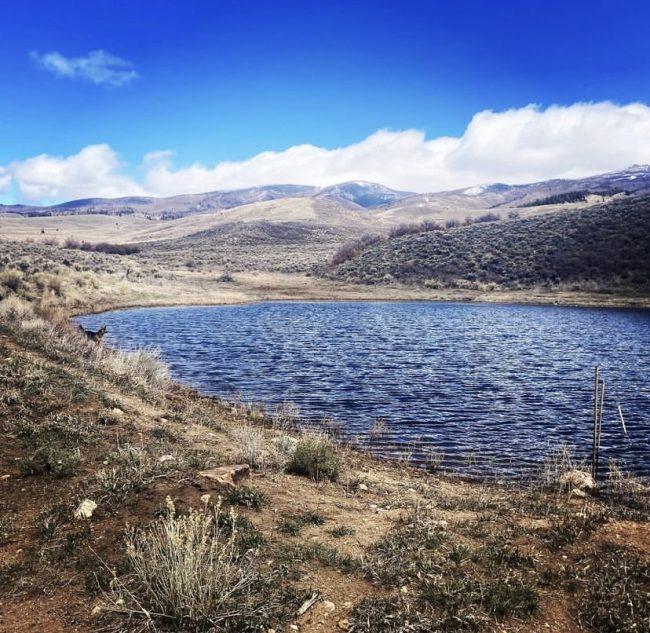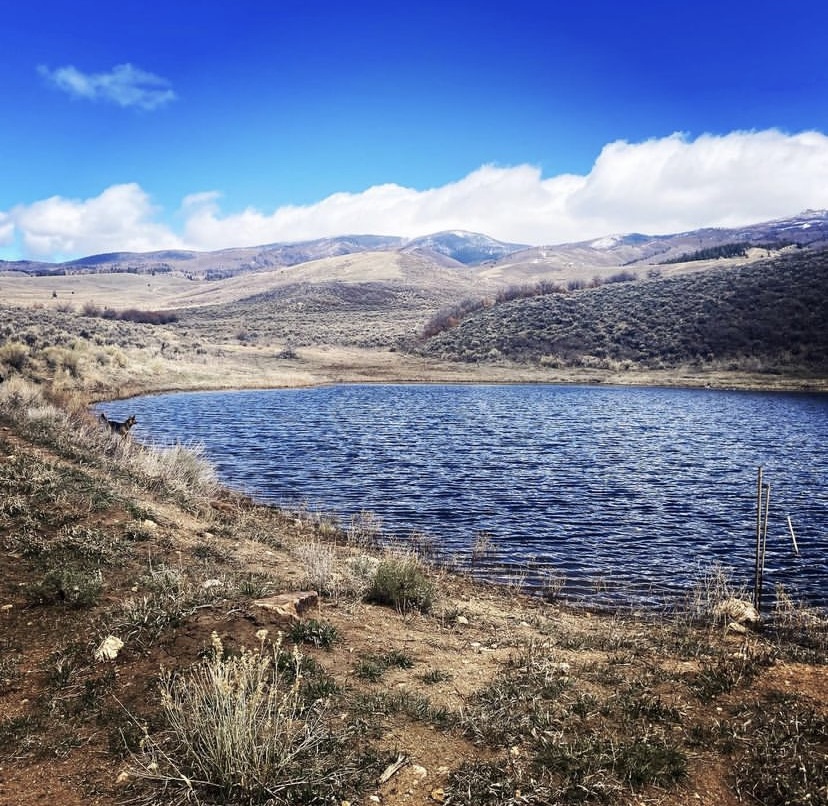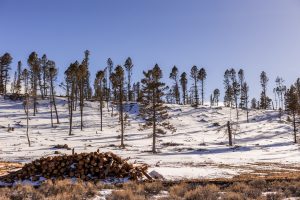A FEW YEARS BACK we visited relatives on their small farm in Vermont. I had never been that far northeast. It was lush and green with healthy woodlands bordering the roads. One night we gathered around a large fire. As folks began heading to bed, I looked back at the fire and asked our cousin, “Aren’t you going to put the fire out?”He replied casually that the fire would die out on its own. Having grown up in the arid West, where historic wildfires now rage year-round, I was astonished at his response. I asked further questions, but the climate is so different and wet in the East, I could not get my cousin to understand my concern.
By contrast, it is important to understand the scarcity of water here in the West. While we en- joy so many sunny days in Colorado, we are also surviving a decades-long drought, compounded each year by climate change. The western U.S. has always been dry. Edward Abbey condemned the development of the West over and over in his writing: “Water, water, water …. There is no shortage of water in the desert but exactly the right amount, a perfect ratio of water to rock, water to sand, insuring that wide free open, generous spacing among plants and animals, homes and towns and cities, which makes the arid West so different from any other part of the nation. There is no lack of water here unless you try to establish a city where no city should be” (Edward Abbey, Desert Solitaire: A Season in the Wilderness).
Yet here we are, a fully developed West scrambling for and arguing over water. And our water laws are complicated. I have been learning more about this firsthand through my acquaintance with Chris White of Yurts at Poncha Pass.
Colorado Central featured White and his sustainable living project in August 2022. He purchased 120 acres in Saguache County near Poncha Pass in 2018 to fulfill a lifelong goal of establishing a carbon-neutral community. His land includes a small pond, less than an acre, that supports a variety of wildlife. But in Colorado that little pond isn’t a pond with birds and deer hanging around it. It is WATER, which, in this dry climate, is not only a precious commodity, it is deeply spoken for, and if you do not “use” your water as defined by Colorado water law, you can lose it.

This point became White’s new reality after he received a letter last summer as he was building an Earthship dwelling and teaching others about this environmentally friendly construction method. The letter, from the Colorado Department of Water Resources, informed White that he would need to drain his pond because it did not have a storage right.
Storing water in a pond increases evaporation, and part of a legal right to store water is the requirement to replace the water that evaporates. Otherwise, downstream owners of senior water rights are deprived of their water. In White’s case, a farmer down the hill owns a senior right that he uses to grow alfalfa. White’s options for keeping the pond filled are limited, complicated and costly, but draining the pond will eliminate an ecosystem that has tremendous value. White’s property is a snapshot of habitats containing biodiversity that, similar to our water resources, has been rapidly depleting. The planet needs its biodiversity to continue to thrive and provide for us the environment we need to survive.
The natural setting of White’s project is a large part of his philosophy — living and working in harmony with nature — and he has been searching for alternatives to draining his pond as he navigates Colorado’s byzantine water laws, based on the Prior Appropriation Doctrine.
Prior Appropriation in Colorado predates statehood and originally encouraged agriculture and mining as “beneficial uses” of water for the common good. The simple part of this doctrine is basically a first come, first served philosophy, as long as the owner consistently uses the water for the beneficial use decreed in water court. Early settlers were granted first rights to water resources even if the water had to be diverted over some distance to serve its beneficial use. “First in time, first in right” is the Prior Appropriation mantra. An older, or more “senior” water right must be fully satisfied before newer, “junior” rights can be utilized.
“With all due respect to prior water rights and our history of agriculture, it is tragic to destroy the pond and its ecosystem without looking at other solutions,” White voiced his frustration with the situation. “The water law does not take ecosystems into consideration. During a time of climate change, the laws are extremely narrow, not recognizing our current state of affairs,” he added, noting that unsustainable water uses are not beneficial to the planet, regardless of seniority.
At first glance, I was incensed at the order for White to drain his pond, and the letter from the Division of Water Resources was frustratingly difficult to understand for anyone not versed in Colorado water law. I went about seeking to learn more.
I learned that the Prior Appropriation Doctrine came under scrutiny at the 2015 Paris Climate Change Summit. Kait Schilling reported in the “Seattle Journal of Environmental Law” that “over-appropriation of water rights,” as has occurred in the Arkansas River Valley, does not account for the rise we have experienced in population growth or climate change (Vol. 8, Issue 1). Sustainable Development Goal 6 from the summit sets up an idea for the world to operate in a sustainable way with regard to freshwater supplies. Schilling does not suggest taking away anyone’s water rights, but advocates for improvements to the way water is used.
Schilling reported that EU, Middle Eastern and North African countries are making adjustments — implementing more efficient irrigation systems and reallocating water away from water-intensive crops to those that are more sustainable. These improvements take place with incentives to farmers who implement the improvements.
White has a master’s degree in oceanography and limnology (the study of inland waters) and is quite knowledgeable about water matters. He was aware that an issue with the pond might come up and has sought to cooperate with the farmer. Part of his plan is to apply to store water in his pond for the farmer to use when needed. White is also willing to use his junior water right to offset water lost from the pond due to evaporation. So far, these ideas have not been accepted by the Division of Water Resources.
Additionally, White met with county commissioners to explore designating the pond for fire suppression under the new Fire Suppression Ponds Water Rights Act (SB 22-114). The new law reads, “More resources are needed for wildfire mitigation to reduce fire risk and to keep fires from becoming large and catastrophic.” The more catastrophic a fire, the more adversely it affects water quality. The new law was enacted in response to the Division of Water Resources targeting ponds to be drained due to lack of storage rights. White’s pond was used to fight the Decker Fire in 2019, and he hopes the new law will allow his pond to remain an asset to the community while preserving its ecosystem value.
Addressing water challenges in the West will require cooperation between government agencies and among water users. Former Interior Secretary Bruce Babbitt claims that the bulk of water availability problems stems from poor water policies and the unwillingness of state governments to require more efficient conservation measures. The nature of the water law system poses difficulties for individuals and smaller landowners. “Going to court on these issues is really prohibitive for a small operation like ours,” White said.
White’s frustration is mirrored in the latest report from the UN released March 20, warning that we are not doing enough to curb carbon emissions and that the results of our industrialization will soon become catastrophic if we do not act soon.
As I learned more about the complexity of water rights, I’ve also become educated about conservation efforts in the Upper Arkansas Valley. Cooperation among the powers that be can absolutely make a difference. Efforts like the Upper Arkansas Water Conservancy District’s Trout Creek Park Multi-Use Project demonstrate that collaboration can provide benefits for agricultural and municipal water users as well as preserve natural habitats and support recreation while conserving water.
The story of this little pond up on Poncha Pass has helped me understand the difficult choices being made during this water crisis and illustrates the overarching need to update our water laws and cooperate in the era of climate change. As Edward Abbey cautioned against, we have grown cities where there should be none, and now we need to find solutions to adequately support the humans dwelling in those cities, ideally without destroying our ecosystems in the process. Water is life, so we don’t really have a choice but to figure this out — together.
Edward Abbey introduced me to conservation in the West. As he wrote, “We always used to think it didn’t matter, that when you mined out one area, or farmed it out, or overgrazed it, you could move to new country beyond the hills, keep moving west. But there are no new places to go anymore. The land is full. We have to stay where we are, take care of what we have. There isn’t going to be anything else.”
Jill has lived in Colorado since she was three years old and happily ran barefoot under the strong sun in the vacant fields of her family’s home. She is a freelance journalist. This article is sponsored by Mark Zander and Leslie Champ.



